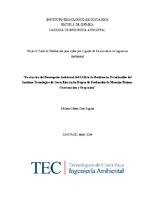Evaluación del Desempeño Ambiental del Edificio de Residencias Estudiantiles del Instituto Tecnológico de Costa Rica en las Etapas de Producción de Materias Primas, Construcción y Ocupación
Abstract
The Life Cycle Assessment is a useful methodology to quantify the environmental impacts of processes, products and services. In this case, it was used to determine the environmental performance of the student residences building of the Costa Rican Institute of Technology in the stages of production of raw materials, construction and occupation. An inventory of the inputs and outputs of each stage of the life cycle was conducted, and then evaluated by the SimaPro 8.0.5 software and the use of the Ecoinvent database. The life cycle evaluation allowed to determine which processes generate the greatest environmental impacts of the building and the benefits of the environmental measures implemented; a comparative analysis of the environmental impact of the stages evaluated was generated as well. In addition, LCA results were verified by a contribution analysis of the most influential processes and a statistical simulation by the Monte Carlo method. Overall, the production of raw materials and occupation stages generated the highest environmental impacts. In the first stage, the materials that cause the biggest environmental impacts are the ones classified into the categories “Metals” and “Minerals”. During the construction phase, the highest environmental footprints were due to transport of materials to the site and the transfer of inert material to the landfill. For the occupation phase, energy consumption and wastewater generation caused the higher impacts. Significant environmental burdens found avoided thanks to the implementation of good environmental practices in the phases of construction and occupation.
Description
Proyecto de Graduación (Licenciatura en Ingeniería Ambiental). Instituto Tecnológico de Cosat Rica. Escuela de Química, 2016.


